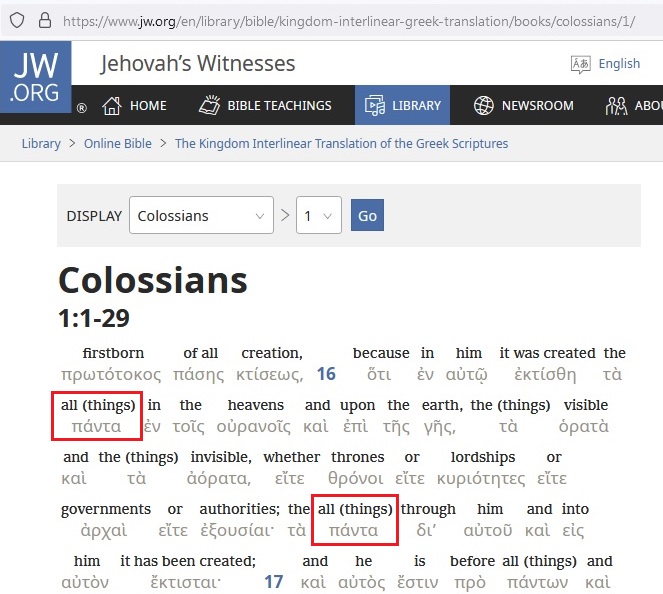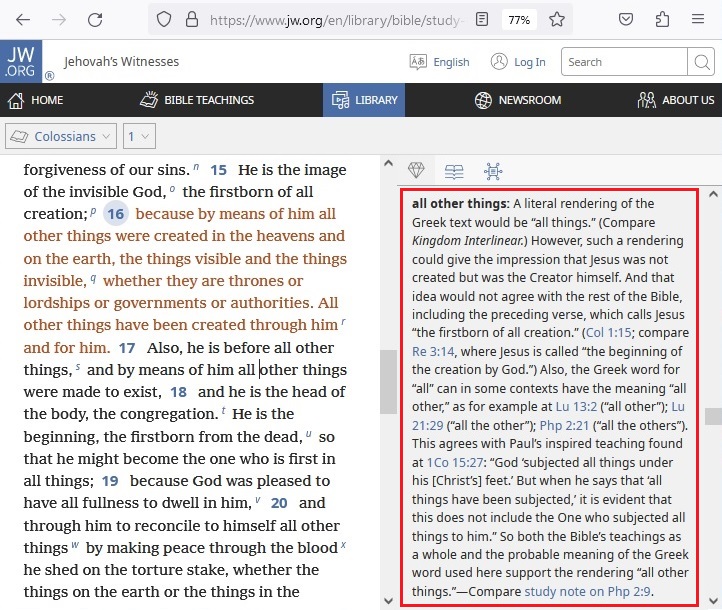Colossians 1:16
Colossians 1:16 - All or All Other?
Colossians 1:16
 Colossians
1:16 in the
New World Translation
says Jesus created "all
other
things":
Colossians
1:16 in the
New World Translation
says Jesus created "all
other
things":
"Because by means of him all other things were created in the heavens and on the earth, the things visible and the things invisible, whether they are thrones or lordships or governments or authorities. All other things have been created through him and for him."
Colossians 1:16 in all other English Bibles say Jesus created "all things" (view). For example, the New King James Version (NKJV) says:
"For by Him all things were created that are in heaven and that are on earth, visible and invisible, whether thrones or dominions or principalities or powers. All things were created through Him and for Him."
Saying that Jesus created "all other things" makes it possible for Jesus to have been created first and then used to create everything else, but if Jesus created "all things," then He is the Creator God. So the word "other" makes a big difference.
All English versions of Colossians 1:16 are translations of the original Greek text. If the original Greek says "all other things," intentionally deleting the word "other" to make the English translation say "all things" would be a serious sin since it would be twisting the Bible to say that a creature is the Creator God.
And if the original Greek says "all things," intentionally adding
"other" to make the English
translation say "all
other
things" would also be a serious sin since it would be twisting the
Bible to say that the Creator God is a mere creature.
The Kingdom Interlinear translation of Colossians 1:16 (this page) below proves that the original Greek says Jesus created "all things":

The reason for adding the word "other" to Colossians 1:16 is given in a long commentary on this page, copied and boxed in red below, and addressed in detail further below:
"All other things:
a literal rendering of the Greek text would be
'all things.' "
This sentence admits that "all things" in the original Greek text has been changed into
"all other things."
"However, such a rendering
could give the impression that Jesus was not created but was the Creator
himself."
This sentence admits that the word
"other" was added to
prevent the Bible from saying that Jesus is the Creator Himself. The Bible is the word of God.
If God says, "all things," but a translator thinks God should say "all other
things," the translator should translate God's words faithfully as "all things" and then at most add a commentary - if he dares - on the side
as to
why he thinks God should says "all other
things." What a translator must not do is simply change God's
word to
say whatever he thinks God should say.
"And that idea would not
agree with the rest of the Bible,"
For one, Jesus being the Creator is not an "idea";
it is what is declared in Colossians 1:16 and elsewhere in the
Bible. For another, whenever the Bible's original text
speaks about the deity of Jesus, the New World Translation mistranslates it
and/or its commentary twists it to try to deny His deity. Colossians 1:16's
declaration that Jesus created all things DOES agree with the rest of the Bible.
What it doesn't agree with are the mistranslations in the
New World Translation
and the mischaracterizations in its commentary, as exemplified above and
below.
The claim above about Colossians 1:15 is erroneous, as explained here.
Regarding Revelation 3:14, "beginning" is how the New World Translation translates the original Greek word "archē," whose definition and usage, as shown in this page, are as follows:
"Definition: beginning, origin. Usage: (a) rule (kingly or magisterial), (b) plur: in a quasi-personal sense, almost: rulers, magistrates, (c) beginning."
So archē also refers to "ruler," and this isn't new to us because archē is in the English word "archangel," which means "ruling angel." So this verse could just as easily be translated to say that Jesus is the "ruler" of the creation as the CEB, CJB, ERV, ICB, NCV and NIV translate it.
As for the claim above that Luke 13:2 is an example that "the Greek word for 'all' in some contexts can have the meaning 'all other,' " the New World Translation translates Luke 13:2 as:
"In reply he said to them: 'Do you think that those Gal·i·leʹans were worse sinners than all other Gal·i·leʹans because they have suffered these things?' "
As shown on this page and in the Kingdom Interlinear, the Greek phrase translated "all other Gal·i·leʹans" in the New World Translation is "pantas tous Galilaious," which literally means "all the Galileans."
The question, "Do you think that those Galileans were worse sinners than all the Galileans...?" can be understood as "Do you think that those Galileans were worse sinners than all other Galileans...?" only because the question distinguishes some Galileans from the rest of the Galileans. But such a context of distinguishing some from the rest is NOT present in Colossians 1:16.
In fact, instead of distinguishing some from the rest, Colossians 1:16, which states, "For by Him all things were created that are in heaven and that are on earth, visible and invisible, whether thrones or dominions or principalities or powers. All things were created through Him and for Him," actually does the opposite; it lumps "all things" together. Therefore, the context of distinguishing some from the rest in Luke 13:2 cannot be used to claim that "all things" should be changed into "all other things" in Colossians 1:16, which has the very opposite context.
As for the claim above that Luke 21:29 is an example that "the Greek word for 'all' in some contexts can have the meaning 'all the other,' " the New World Translation translates Luke 21:29 as:
"With that he told them an illustration: 'Notice the fig tree and all the other trees.' "
As shown on this page and in the Kingdom Interlinear, the Greek phrase translated "all the other trees" in the New World Translation is "panta ta dendra," which literally means "all the trees."
The sentence, "Notice the fig tree and all the trees" can be understood as "Notice the fig tree and all the other trees" only because the sentence distinguishes one tree from the rest of the trees. But such a context of distinguishing some from the rest is NOT present in Colossians 1:16.
As mentioned above, Colossians 1:16 does the opposite; it lumps "all things" together. Therefore, the context of distinguishing some from the rest in Luke 21:29 also cannot be used to claim that "all things" should be changed into "all other things" in Colossians 1:16, which has the very opposite context.
As for the claim that 1 Corinthians 15:27 supports the "all things" in Colossians 1:16 being changed to "all other things," the New World Translation translates 1 Corinthians 15:27 as:
"For God 'subjected all things under his feet.' But when he says that 'all things have been subjected,’ it is evident that this does not include the One who subjected all things to him."
This verse isn't saying that "all things" mean "all other things." It is simply stating what is obvious, that since God the Father is not a "thing," "it is evident" - the original Greek word "dēlon" (source) means "clear" or "self-evident" - "that this does not include" God the Father.
The last claim in the paragraph above reads:
"So both the Bible’s teachings as a whole and the probable meaning of the Greek word used here support the rendering 'all other things.' "
Such a conclusion is unwarranted and misleading. When qualified one by one, none of the verses cited by JW.org in its commentary boxed in red above supports changing the "all things" in Colossians 1:16 into "all other things." In a vain attempt to try to justify twisting one verse, JW.org has twisted a bunch of other verses and thrown them against the wall, hoping that something will be seen to stick.
You and a dog are both creatures, not the Creator, yet you would be insulted - and rightfully so - if someone said you were a dog. Saying that the Creator God is a mere creature is a much bigger insult than you - a creature - being called a dog - another creature. In fact, calling and believing the Creator to be a creature is blasphemy that requires repentance and seeking God's forgiveness.
